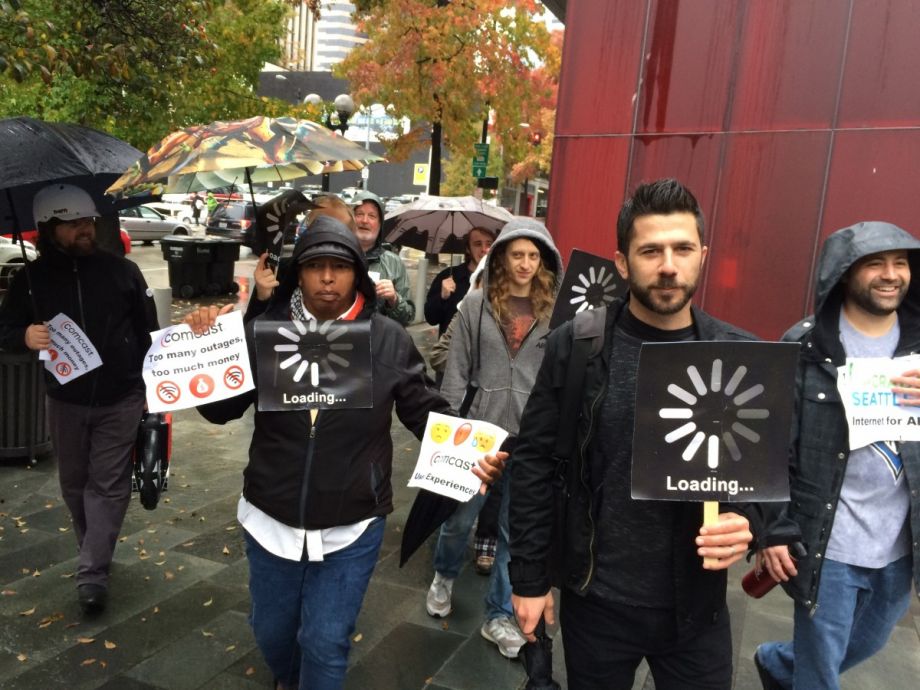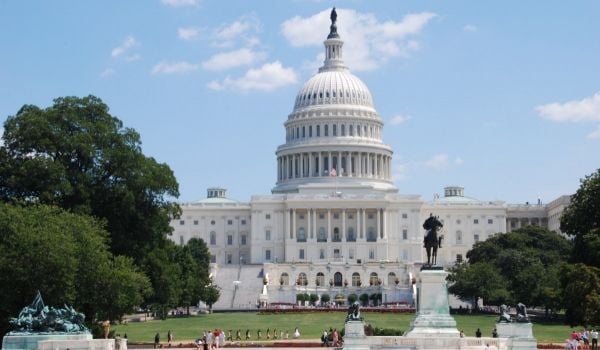Last Wednesday, a small group of activists took to the Seattle streets to protest Comcast’s internet service and call for the city to implement a municipal broadband network. The 10 protestors marched slowly through the pouring rain and downtown lunch crowds from Comcast’s downtown store to City Hall holding signs decrying slow internet and poor customer service. The slow marching speed — it took an hour to cover the mile-long route — was meant to illustrate the frustrations of slow internet. The group had to stop a few times en route to “buffer.”
The march came just days after Council Members Kshama Sawant and Rob Johnson proposed an amendment to the city budget to fund a municipal broadband implementation plan. If it passes, it will provide $300,000 to create a 10-year implementation plan and fund a new full-time employee to spearhead the work. In September, the city council also amended the city’s 20-year comprehensive plan to include a commitment to “study and potentially implement a municipal broadband system” as part of Seattle’s growth strategy.
“Public broadband is important as a public utility. We deem water, electricity and gas to be public goods, but leave internet to private corporations,” says Devin Glaser, director of Upgrade Seattle, the activist group leading the push for city-run internet in Seattle.
Comcast refutes the marchers’ claims of slow speeds. “We understand the importance of our services in the daily lives of our customers and are working hard to create a best-in-class experience for them every day,” says Walter Neary, a Comcast spokesperson in Seattle. “In the last six years, we have increased speeds four times and have invested $1 billion in Washington to upgrade our reliability and capacity and to prepare for new gigabit services.”
The municipal broadband conversation isn’t new for Seattle. The city has funded seven feasibility studies over the years. The most recent one found that municipal broadband would cost between $463 million and $630 million to implement and need at least 43 percent of Seattle single-family households to sign up in order to pencil out. For Mayor Ed Murray and Chief Technology Officer Michael Mattmiller, that signaled municipal broadband would be too pricey and too risky in a competitive market. (Comcast, CenturyLink and Wave all sell internet service in Seattle.)
City council expressed a similar feeling last year: They voted 6-2 to reject a $5 million municipal broadband pilot project in the 2015 city budget. There are four new council members as of 2016, so activists are hoping they might now have the majority they need to approve the 10-year implementation plan.
Upgrade Seattle points to Chattanooga as evidence that municipal broadband works. More than 50 percent of households have signed on to such service in the Tennessee city since it launched there in 2010, and it’s been credited for everything from an economy boost to downtown revitalization and narrowing the digital divide.
“Faster internet might seem like a boutique problem, but it’s a social justice issue,” says Brett Hamil, a Seattle comedian and activist and one of the organizers of last week’s march.
Municipal broadband proponents say with job applications, city information, homework, banking, shopping and nearly every other facet of modern life online, internet access is an equity issue. A 2015 study found about 15 percent of Seattle homes do not have internet access.
“There is a strong argument to be made that internet is a utility like any other city-owned utility,” says Council Member Johnson, who met with the slow marchers at City Hall along with Sawant. “As a city that’s so technologically focused with so many people working in high-tech or working from home using technology, this is a critical infrastructure investment to keep us economically competitive.”
Sawant is optimistic that Seattle residents and small businesses want and will support municipal broadband, but recognizes it will take a big push to implement it.
“We’ve come this far because the wider community in Seattle is demanding it, but that will also be necessary going forward,” she said on Wednesday. “We know the pilot program can work. We know Chattanooga has succeeded in doing it. We can do it in Seattle. But in order to do so we will need to keep building the movement.”
The city council will vote on the budget in late November.

Josh Cohen is Crosscut’s city reporter covering Seattle government, politics and the issues that shape life in the city.
Follow Josh .(JavaScript must be enabled to view this email address)
















